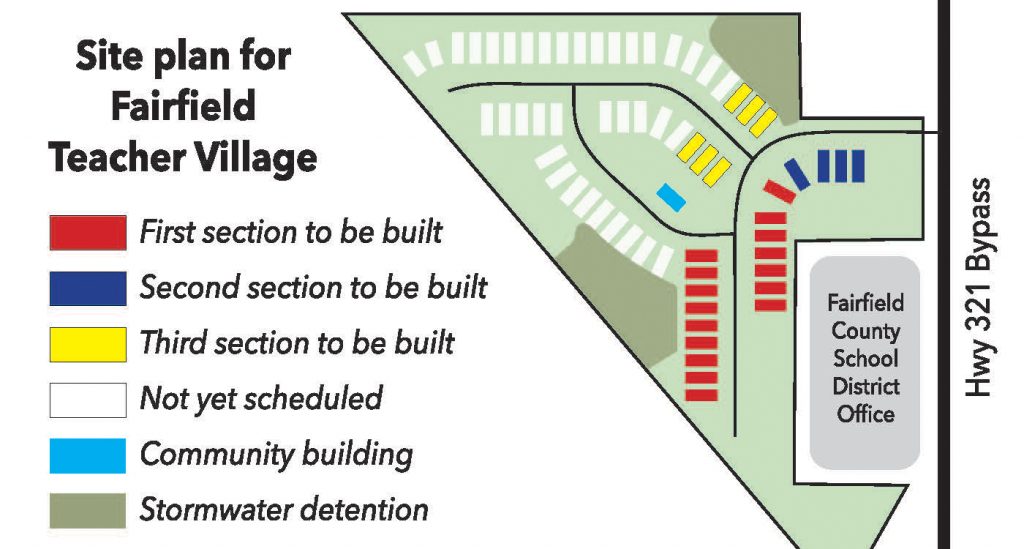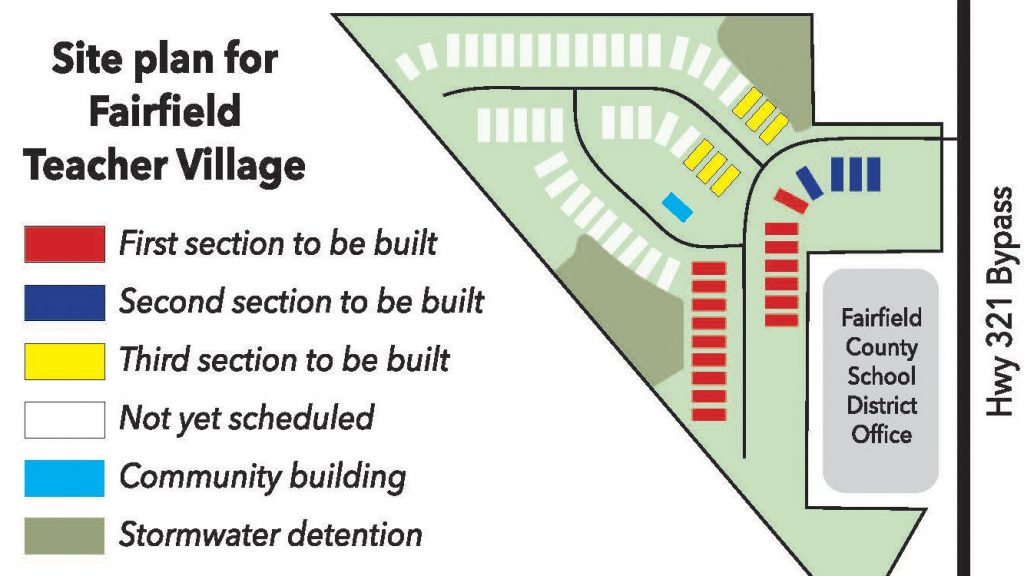
WINNSBORO – Five years after Fairfield County school officials announced the goal of building a new, rent-controlled housing development for teachers, site infrastructure is nearing completion, and construction of the first homes will start in a few weeks, says Sue Rex, Chair of the Fairfield County School District Education Foundation.
“We just feel like we’re addressing one issue, and that’s how do you recruit and retain teachers in a rural district,” she says, referring to the challenge that first sparked the proposal. “We’re finding our way, week by week.”
The foundation, a nonprofit, is overseeing the Teacher Village project.
When the idea was first presented in 2018, it seemed – even to many supporters – that it would never happen. But the project was infused with $2.2 million earmarked for the project in Fairfield County’s settlement with Dominion following the failed nuclear power plant project.

The Fairfield County school board committed 22 acres of district-owned land, in between the administration building and the high school, as a site. The project then received a $600,000 contribution from the United Way – and was granted a 95 percent property tax discount by both Fairfield County and the Town of Winnsboro.
The foundation borrowed the additional $1.3 million needed to complete site work, infrastructure, and construction on the first 16 houses, Rex says.
Still, money is tight as the project moves forward. After spending around $200,000 of reserved funds to blast ground rock at the site, a campaign is underway to raise more money.
Civil Engineering of Columbia has assisted with many aspects of the project, Rex says. Upland Construction has been handling the site work and infrastructure, while builder Wade McGuinn is set to do the home construction.
The foundation’s 14 board members are currently in the process of selecting a property manager for the development once it’s completed, she says, and they’re also putting together the process to determine which teachers will have the opportunity to live in the first 15 homes.
They expect to begin the application and selection process perhaps as early as February.
“Our goal is to get them moved in before the next academic year begins,” she says of the first occupants of the homes. “It’ll probably be the end of the summer, but our builder tells us that he’ll have them ready, so that’s our hope.”
The sixteenth home, Rex says, will be leased by the University of South Carolina for seniors in the university’s teaching program to live and learn from the advice and support of the experienced teachers in Fairfield schools.
Meanwhile, she says, the foundation is seeking grants to pay for construction of the next 10 homes. She also hopes to find funding for a clubhouse to serve as a collaborative space and, eventually, more houses; the site can support up to 50.
With the infrastructure and first 16 homes weighing in at a cost of approximately $3 million, once completed, the revenue they generate will not cover more than the bills generated by the project, such as property management and maintenance and mortgage payments toward the borrowed money, Rex says.
That’s because the rent will be kept low – currently $700 to $900 a month – potentially representing well over $1,000 in monthly savings compared with market value – as an incentive for teachers to live and work in Fairfield County, Rex sad.
It will only be open to certified teachers employed by the county, she said, and those who’ve worked for the school system the longest will get priority.
She says the fact that the majority of Fairfield County’s teachers currently live outside the county is a common situation for rural counties around the United States, which often struggle to attract and retain teachers for their schools and also lack housing options.
The idea behind the Teacher Village concept, Rex says, goes beyond the monthly dollar savings and collaborative concept: Not only will teachers living in the community spend their money locally, they’ll also have the opportunity to save for a down payment on a home of their own – hopefully also to be located in Fairfield County.
The whole program is designed to serve as an incentive for recruitment and retention of teachers who might otherwise be enticed to other locations.
Rex says her hope is that the project’s eventual success will put the Teacher Village concept in a larger spotlight – and encourage corporations in other localities to provide the catalyst to fund similar projects, helping other rural school systems attract and retain teachers.
“Our foundation members are very excited that we can kind of set a path for other school districts across not only South Carolina but the nation to see that you can address recruitment and retention in rural parts of America if there’s a team effort going on,” Rex says.
“For us it was a team effort: we had the corporations, we had the city and the county, we had the school board, we had the legislative assistance, all that is the roadmap to success from my perspective.”

